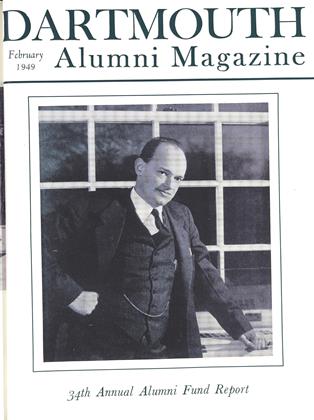HENRY BESTON is a man who passsionately believes in the elan vital. What has happened in the world, he thinks, is "an alienation from Nature unexampled in human history,.... which has cost us our sense of reality and all but cost us our humanity Torn from earth and unaware, having neither the in- heritance and awareness of man nor the other sureness and integrity of the animal, we have become vagrants in space, des- perate for the meaningless which has closed about us."
In Northern Farm (Rinehart, 1948), written in a prose doric in its simplicity and purity, and yet romantic in its warmth and vitality, Mr. Beston writes as one who has never divorced himself from the com- plete mystery of living, and as one who, in a measure known only to himself, has partaken to the full of human peace and human joy.
Ostensibly the book is an account of the adventure of living, as the countryman Beston sees life, on his Nobleboro, Maine, farm, between the wide Kennebec and the Penobscot, on fresh water, yet "only a little inland from the sea."
He is magnificent in his descriptions. With Conrad, he will make you hear, make you feel and, above all, make you see, even if you have never seen a New England farm drowsing in the warm summer sun, or rigidly still, remote and icy in winter. 11 is quite possible you may have the hardi- hood to want to live on such a farm. He came near convincing me, though I live in the country, and know how cold seeps through the wall like a poison gas when it is thirty-five or forty below.
This book is highly recommended; especially to my former students in Comparative Literature 24 who heard Henry Beston, who met him in my house, and who read his classic The Outermost House (soon to be out in a new edition), and who may in Northern Farm reacquaint themselves with this most striking personality. He is at his best here. This is a memorable and living book glowing with honest good sense and friendly good will.
The illustrations by Thoreau MacDonald are just right.
Johnsonians will enjoy a little book: Dr. Campbell's Diary of a Visit to England in 1775 (Cambridge University Press, 1947). This edition, though not the first (1854 in Sydney, Australia), presents for the first time a complete and accurate text of Campbell's narrative. The Johnsonian interest is of first importance but the Irishman Dr. Campbell also discusses in an entertaining manner English men and manners in the 18th century. The notes are also valuable, and Mr. James L. Clifford has done an admirable job as editor.
Douglas S. Freeman's George Washington is a considerable ($15) but worthwhile investment. So far I've about finished Volume I and my immediate reaction is that this is not "popular" biography but is written for the Washington admirer who wants a scholarly array of facts which march irresistibly toward their goal but leave little to the imagination. The footnotes are copious and not to be overlooked. Before finishing these two volumes on the young Washington (up to his 27th birthday) the reader will know just about all there is to know about the young, shrewd, ambitious, Virginia planter, and land speculator, who was to have such a profound influence in shaping the destiny of these United States of America. We follow him on his trips westward into Indian and French country and get an understanding of his long apprenticeship as a soldier. There are illustrations and useful maps.
I hope Mrs. E. K. Hall will read H. V. Morton's In Search of South Africa (Dodd, Mead & Co., 1948.) as it will remind her o£ her own trip through Cape Town, Johannesburg, and the Karoo country to the Kruger National Park and Victoria Falls. I was glad to learn that Francis Brett Young lives in St. James near Cape Town. He had fought with Smuts in 1915 (Marching on Tanga) and "had already fallen in love with the Cape." Here in lively prose you will read of Kimberley and its diamonds, of the incredible Cecil Rhodes who died at 49, of Barney Barnato, of the legend of the Flying Dutchman, of the people, the Zulus, and of how the blacks and the whites live in close juxtaposition with no civil rights bill apparently for decades to come. Here the "baas" rules, and no mistake about it. Our winter is their summer and as you read this in the cold of February they are probably very hot in Johannesburg. You can't go wrong with this book if you would like to know something about South Africa.
Keith Sward's The Legend of HenryFord ought to prove entertaining to business men, industrialists, public relations personnel, believers in peace ships, drivers of Fords, and of those still on the way to earning their first billion. A solid piece of work and most revealing of our times.
 View Full Issue
View Full Issue
More From This Issue
-
 Class Notes
Class NotesD. N. A. A.
February 1949 By MAX PRYOR, J. FREDERICK PFAU III -
 Article
ArticleThe Indian Sharpens Up His Gridiron Tomahawk
February 1949 By BILL CUNNINGHAM '19 -
 Class Notes
Class Notes1937
February 1949 By ROBERT P. FULLER, ARTHUR H. RUGGLES JR. -
 Class Notes
Class Notes1935
February 1949 By HENRY R. BANKART JR., FREDERICK T. HALEY -
 Class Notes
Class Notes1928
February 1949 By OSMUN SKINNER, RUPERT C. THOMPSON JR. -
 Class Notes
Class Notes1931
February 1949 By A. W. LAUGHTON, WILLIAM H. SCHULDENFREI







